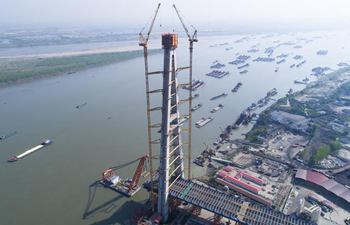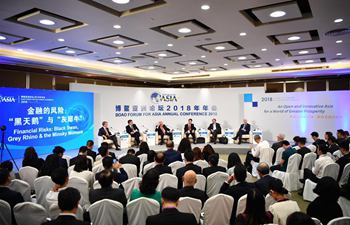
Nepali Prime Minister KP Sharma Oli addresses the handover ceremony of China-Aid Solar Photovoltaic Project at Singhadurbar in Kathmandu, Nepal, on April 10, 2018. The Nepali government administrative headquarters known as Singhadurbar will be officially illuminated by solar power starting Tuesday with the help of China Aid. (Xinhua/Sunil Sharma)
KATHMANDU, April 10 (Xinhua) -- The Nepali government administrative headquarters known as Singhadurbar will be officially illuminated by solar power starting Tuesday with the help of China Aid.
At a special ceremony organized in the premise of Singhadurbar in Kathmandu, the completion of Solar Photovoltaic Project was inaugurated by Nepali Prime Minister KP Sharma Oli and Chinese Ambassador to Nepal Yu Hong.
Prime Minister Oli expressed gratitude to the Chinese government for the installation of the solar power system which is efficient and cost-effective.
"Solar energy is an important technology for the mountainous country like Nepal in terms of efficiency and cost. I am thankful to China for the construction of this solar photovoltaic project in a short period of time and hopeful that this project can work as a model project for other areas."
On the same occasion, the prime minister also said that China's Belt and Road Initiative has opened up a new avenue for cooperation between Nepal and China in multiple sectors including energy.
Stating that solar technology is crucial for the modernization of agriculture and for the operation of small and large scale industries, Oli said that it is necessary for Nepal to end dependence on traditional electricity sources for energy needs.
"Though we are rich in water resources, sole dependence on hydropower is costly. Thus, we are focusing on renewable energy," the prime minister said.
The installation of solar panels started in November 2016 in at least 21 buildings around the central secretariat of the Nepali government, including the Prime Minister's Office, the Ministry of Finance and the Ministry of Energy, among others.
According to government officials, the project cost is around 37 million Chinese yuan (about 5.97 million U.S. dollars). The 14-month long project was implemented by China State Construction Engineering Corporation Ltd.
"I hope that this project will become a model project for Nepal to expand energy supply channels, strengthen electricity supply security and realize green development," Chinese Ambassador Yu Hong said.
"The Chinese government has been engaged in efforts to help Nepal realize electricity development and will continue to provide assistance and support within its capacity the economic and social development of the country," Yu said.















